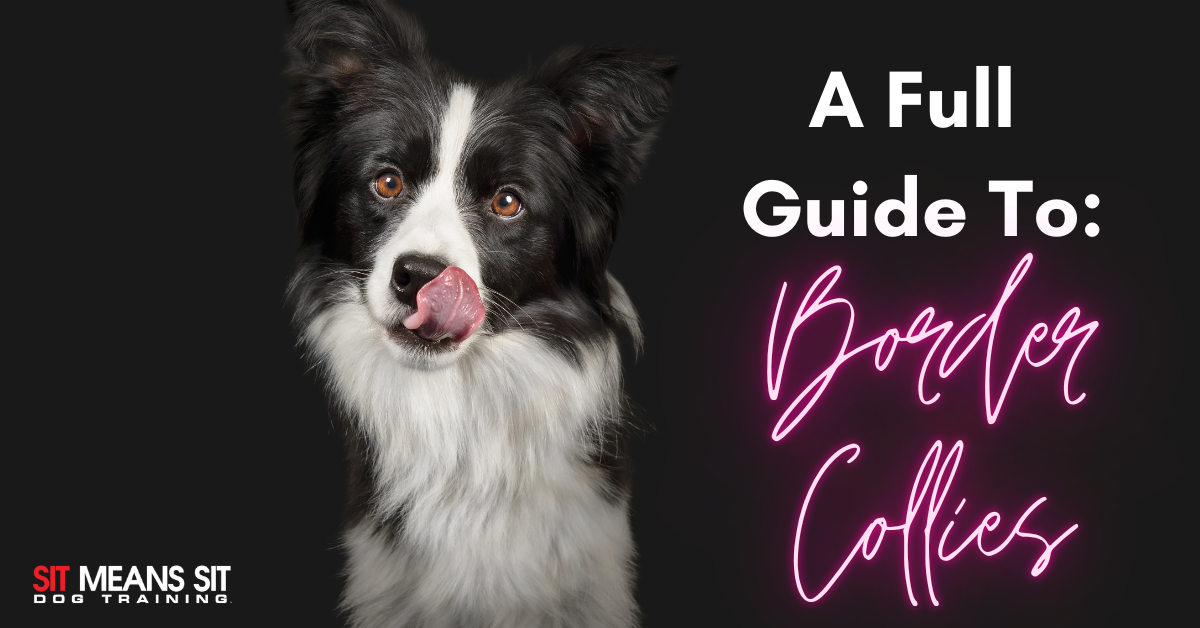
Border Collies: Everything You Need to Know
Bringing home a dog is a big step in a person’s life that requires a lot of careful consideration and planning. From researching temperament, dietary needs, and overall health of a breed, there is a lot a dog owner needs to know.
Thinking about bringing home a Border Collie? Here’s what you need to know.
History
The Border Collie breed was originally bred to gather and herd sheep in the countryside of Scotland and England. They quickly became one of the most valuable tools to shepherds and only the best herding dogs were bred with each other.
As they continued to be bred in various regions throughout the countryside, they began to vary based on the terrain and work they were doing. They became known as Welsh Sheepdogs, Northern Sheepdogs, Highland Collies, and Scotch Collies. Their name now reflects their partial Scottish heritage as the word collie is derived from the Scottish dialect word for sheepdogs.
In 1860, Scotch Sheep Dogs were being shown at the second ever English dog show where they caught the eye of Queen Victoria. She quickly became an enthusiast of the breed.
While the Border Collie has had a robust and important place in history, it did not get recognized by the American Kennel Club until 1995. They are recognized today as the premier sheepherding dog.
Quick Facts
- Height: 18 to 22 inches tall at the shoulder
- Weight: 30 to 45 pounds
- Life Span: 12 to 15 years
- Breed Category: Herding Dogs
- Shedding: Yes
Temperament and Personality
Border Collies are characteristically high energy, alert, hard-working, and intelligent. Their high energy comes from their history of spending all day out in the field working. They had to be quick learners to succeed on farms so they are very smart. This means they can be easily trained but it can be difficult to keep them challenged and entertained.
Their high intelligence also means that they get bored easily which can lead to annoying or destructive behaviors such as barking, digging, or chasing cars. They were bred to be in motion all day so they need a lot of exercise and mental stimulation to stay happy and out of trouble.
They are known to be very in tune with their owner and sensitive to any possible cue given by them. They were historically trained to know what to do just from a simple raised eyebrow or wave of the hand so they will always be searching for some kind of direction from their human.
Their high intelligence can also mean that they are strong-minded and independent. They will always be looking for work, even if not directed to do so. If they do not have a specific task, they may resort to herding children or other household animals, as well as cars.
Health
While Border Collies are generally a healthy breed, the most common health issues arise from irresponsible breeding practices. When choosing a Collie breeder, make sure to do some research into their breeding practices.
The most common health issues to look out for include:
- Hip Dysplasia: This occurs when the femur doesn’t fit properly into the hip joint which can cause pain or lameness in the rear legs. Dogs with hip dysplasia should not be bred. Ask your breeder if the parents have been screened.
- Progressive Retinal Atrophy: This is a group of eye diseases that cause the gradual breakdown of the retina. It can start as night blindness and continue to progress from there.
- Collie Eye Anomaly: This is an inherited eye condition that causes changes in the eye which can sometimes lead to blindness.
Care
Border Collies will thrive the most in areas that give them room to roam. A fenced-in yard or a farm or ranch that allows them room to stretch their legs. A physical fence will be important if you live near a road as their instinct to herd might cause them to chase cars.
Your Border Collie will need dedicated time every day for exercise and mental stimulation. They have high energy and without a way to release it, they can have behavior problems and become unhappy. Dog sports are a great way to tackle mental and physical stimulation at the same time. There are at-home options or dog training gyms that offer training and classes.
Border Collies come with either a rough or smooth coat. The grooming is practically the same for both and the difference is the length and texture of their top coat. To keep them properly groomed, weekly brushing will be important to properly distribute coat oils and prevent matting. Regular brushing will also help reduce the amount of shedding hair around your home. Baths will only be necessary a few times a year when they start to stink.
Brush your Collies teeth at least a few times a week to prevent plaque and tartar from building up and causing gum diseases and bad breath.
Nails will need to be trimmed about once a month. A good rule of thumb is that if you can hear their nails tapping on the ground when they walk, the nails are too long.
Overall, the Border Collie is a wonderful addition to a family if you are prepared and know what to expect. If you would be more interested in adopting than shopping for a Collie, look into the Midwest Border Collie Rescue for more information.
